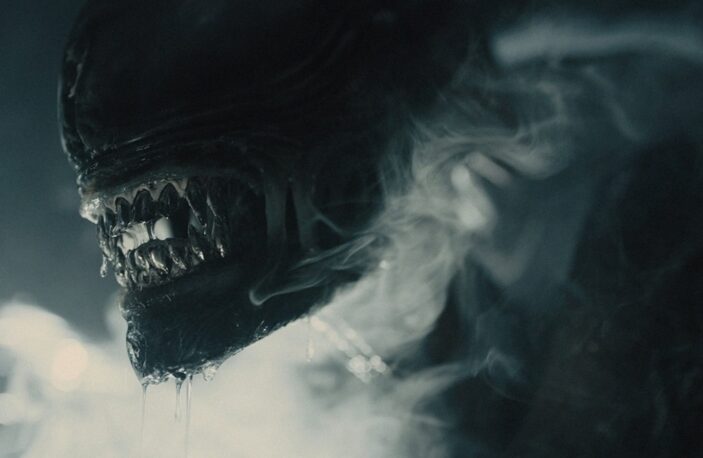
Whilst Alien: Romulus is the seventh in the line of Alien features – ninth if you count the Alien Vs Predator movies (and it’s okay if you don’t, because…choices) – Fede Alvarez‘s nasty, carnivorous entry is a stand-alone sequel placed between Ridley Scott’s defining original, 1979’s Alien, and James Cameron’s continuation, 1986’s Aliens; Alvarez and frequent collaborator Rodo Sayagues‘ script set 20 years after the former.
Following a structure not unlike Scott’s film – the director on hand here as one of the producers – Alvarez, who has shown his strength in the genre, helming such atmospheric efforts as Don’t Breathe and the gore-filled Evil Dead remake, opts to brutally target the disaffected Gen Z archetypes, here in the form of a group of miners who are at their fill of their government’s treatment of their kind, devising a plan to travel to another planet, one that seemingly has a healthier structure and, most importantly, sunlight; we learn that the Jackson’s Star colony they inhabit has zero days of natural light
The majority of the group are painted in strokes of “victim-in-waiting” – there’s tough, unofficial leader of sorts Tyler (Archie Renaux), his sweet, younger sister Kay (Isabela Merced), their cousin Bjorn (Spike Fearn), probably the most unlikeable of the bunch, and his girlfriend, and intended pilot, Navarro (Aileen Wu) – but we do find an emotional connection to Rain (Cailee Spaeny) and, by extension, her “brother”, Andy (David Jonsson, arguably the film’s most interesting character), an android programmed by her late father to act as her protector.
To get to their intended new planetary digs though, the crew need fuel, and they just so happen to have learned about an abandoned ship floating in the outer ether. A smash-and-grab job is planned before the ship collides with a set of neighbouring planetary rings; 36 hours is their window, but Tyler, in all his misplaced confidence, believes they’ll be in and out within 30 minutes.
We all know how this is going to play out in one way or another, and whilst Alvarez delights in the expected screaming and face-hugging of it all – to say the aliens on board here are aggressive is an understatement – Romulus ultimately travels to a destination that very few will see coming; the audible gasps to a certain reveal from the audience speaks to the genuine unforeseen nature the director commits to.
And though Alvarez’s sublime hold on how to create successful tautness and atmospheric unrest is present throughout the majority of Romulus‘s 119 minutes – there’s one scene involving Rain, Tyler and Andy trying to remain as quiet as possible, as well as contend with the shift of their body temperature, that is body-clenchingly tense – less successful, or, perhaps more correctly, potentially controversial is a narrative choice made that ties this intimately to the original film. Whilst the overall look of the film is perfectly catered to what Scott created in 1979, down to the technology and ship design, this inclusion (and its overt CGI) could irk purists and be deemed in poor taste.
Aside from such a decision – and a line of dialogue that, similarly, may take audiences briefly out of proceedings – Alien: Romulus is a slickly executed scarer that honours the legacy of the series in a manner more organically than the initial sequels that followed, 1993’s inferior Alien3 and 1997’s more insane-leaning Alien Resurrection. With Romulus, Alvarez has effortlessly inserted himself into the timeline with a blend of old-school respect and new-school brazen.
![]()
![]()
![]()
![]()
![]()
FOUR STARS (OUT OF FIVE)
Alien: Romulus is now screening in Australian theatres.
